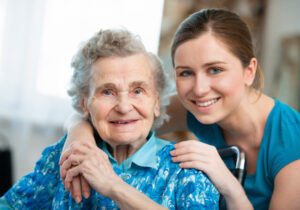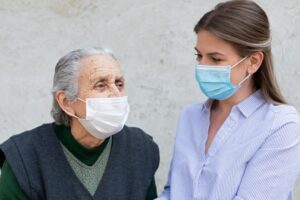Families and older adults with memory loss often turn first to medication to treat the disease or the symptoms of the disease. However, for those of us who have worked in the field of aging for years, we have found that so many other approaches work, and often they are overlooked, discounted or ignored.
Below are some helpful non-medical approaches to memory care for older adults with memory loss living at home or in a community setting.
The Might of Music
Live Music, especially a licensed music therapist, can lead amazing classes where people with memory loss can participate, play instruments, relate to historical music, sing, and even share their love for music. Music can improve mood, movement, and even memory concentration for older adults with memory loss.
Benefits of Massage Therapy
Touch is often excluded in memory care, and it is wrong to overlook the benefits of massage therapy for older adults with memory loss. Hand, neck, and arm massage can relax older adults and help them focus. It is critical to ask for permission from the family or person before exploring massage therapy. Having a therapist or certified person is also essential.
Presence of Pets
Older adults love birds, dogs, and cats and feel loved by their presence. Having a pet with them, no matter where they live, even in a memory care unit, can help transition and adaptation. Older adults often report feelings of safety and trust with an animal nearby. It is equally important to make sure the pet is being cared for. Also, pets should receive all their required vaccines and appropriate care.
Impact of Historical Classes
Historical review of the past is among the best programs for older adults. Reviewing historical wars with history books, slide shows, 1950s car images, high school yearbooks, or other images can excite the older adult and trigger memories. It can often give them greater focus and may improve verbal capacity.
Power of Cognitive Therapy
Cognitive therapy is not about reversing the disease or a cure. However, cognitive therapy may stimulate thinking, create calmness, and even improve self-esteem and depression for those with memory loss. Giving an older adult one-on-one time with a licensed social worker or trained cognitive therapist may improve depression and sadness or give them a feeling of purpose.
For an example of how cognitive therapy can help with memory care is a therapist who works with an engineer and reviews mathematics and math-related ideas. Using the brain’s reserve capacity is essential, and inspiring older adults to share their past wisdom and their passions or what they have learned in life is critical. Every person has something to share and deserves to feel significant.
Persistence of Spiritual Care
Spiritual care is an essential aspect of caring for someone with dementia; often, older adults’ spiritual needs are overlooked, ignored, or even forgotten.
One example I recall from a visit to one of my memory care facilities years ago was with an older Catholic adult who was nonverbal. The family discontinued weekly communion and Catholic spiritual engagement since they did not have faith this would help their loved one regain verbal skills. They felt she was in the later stages, nonverbal for a long time, and their mom did not need it. As I was visiting, a Catholic priest entered the home; as soon as the resident saw the priest, she started reciting the “Our Father Prayer” and “Hail Mary Prayer.” She was smiling, and her eyes lit up. We then placed a Large Virgin Mary statue in her room, added Communion visits, and prayed with her at night. She improved and was much more alert and oriented. I would say even more focused and verbal.
Older adults raised in a religion may revert to it or miss their religious time. The comfort that spiritual interaction may give is often more beneficial than other therapies or interactions, as reported by residents and families.
Memory Care for Older Adults
From music, to pets, to prayer, improving memory care doesn’t necessarily need to start with medication. The brain is extremely powerful, so never discount how the small things can have great impact on your loved ones.
At Assured In Home Care, we know the struggles of memory loss, dementia, and Alzheimer can be painful on the loved ones caring for older adults. Our compassionate Caregivers are here to help you navigate personalized and affordable companionship services to older adults while aging at home. We are a state license agency, well-resourced to care for unique older adults. Our benefits and services aspire to allow our service to remain independent and stay connected to their loved ones and friends.
For more information on our Caregivers or to get in touch with a team member, please fill out our Contact Us form. Together, we can help you and the memory care needed for your loved one.








